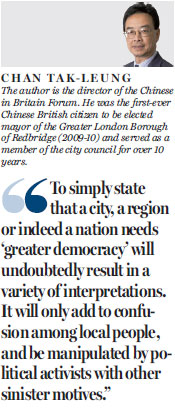Universal application of democracy is sheer folly
Updated: 2016-12-02 06:54
By Chan Tak-leung(HK Edition)
|
|||||||||
Chan Tak-leung writes that the call for 'greater democracy' in HK by former governor Chris Patten is ill-defined, misjudged and impractical for the SAR and it only shows his penchant for playing to the gallery
Lord Patten, the last governor of Hong Kong, was in town recently and once again he demonstrated that he has perfected the art of speaking with a forked tongue. For while His Lordship pronounced that he was opposed to any independence movement in Hong Kong, in the same breath he declared himself a great supporter of "greater democracy and better government" in the Hong Kong SAR. What could he have meant by that? Regarding democracy, was he referring to the British model of universal suffrage that he is so familiar with since he has been "elected" as a member of parliament, "appointed" as the governor of Hong Kong by the then prime minister after he lost his parliamentary seat, "nominated" to be a commissioner in the European Union, and "elevated" with a peerage as he sits in the unelected House of Lords whose task is to scrutinize proposed legislation put forward by elected members in the lower house?
One hopes that when he promotes "greater democracy" in Hong Kong he does not mean to recommend that Hong Kong should also adopt the British model of governance. If this is the case, it would mean that Hong Kong should have an elected legislature, which there is already, an upper house of unelected members, not to mention the installation of a sovereign king or queen as well.

To articulate warm words such as "greater democracy" as Lord Patten did is both patronizing and open to misinterpretation and misunderstanding, proving that he was merely using the term as a crowd-pleasing chant, nothing more nothing less.
Is he not aware of the fact that democracy means different things to different people in different situations? To simply state that a city, a region or indeed a nation needs "greater democracy" will undoubtedly result in a variety of interpretations. It will only add to confusion among local people, and be manipulated by political activists with other sinister motives. Words such as democracy and freedom being bandied around without any qualification, without taking into consideration the beliefs and historical, cultural, social, geopolitical, economic and other factors of a specific area, in this case the HKSAR, only make for good sound bites but is actually meaningless and unhelpful.
Lord Patten's expression of his misgivings at the lack of speed in Hong Kong's journey to universal suffrage is a sentiment shared by many citizens of Hong Kong. He might have forgotten that he was the one who pushed through electoral reforms in 1994, three years prior to the handover in 1997, without any consideration of the many factors already mentioned, which resulted in the current political dichotomy in the legislature. For him to come all this way to deliver his message may be with the best intentions, but he should nonetheless be told that the universal application of democracy is nothing more than dogma, if not theoretical on his part. His pronouncements are ill-defined, misjudged and impractical for the SAR.
If one examines how "democracy" is working in other nations across the globe then one can see its applications are by no means 100 percent democratic as far as their respective electorates are concerned. The recent presidential election in the US, for example, has resulted in Donald Trump becoming president-elect by amassing 306 Electoral College votes, which is more than Hillary Clinton's 232 votes. However, if one defines democracy as "one person, one vote" then Clinton's popular vote of 64 million would have a 1.7 percent margin over Trump's 62 million - but in this case she is the loser.
It demonstrates that universal suffrage is being practiced but in the end being defeated by a not-so-perfect voting process. If this can happen in a recognized democratic superpower like the US, what chances are there for "greater democracy and better government" for other countries like Egypt, Iraq, Afghanistan, Libya and Syria - nations with totally diverse backgrounds to the ideal democratic state that the US intends to promote?
In Britain, when David Cameron decided to quit after the Brexit vote in June this year and Theresa May became prime minister after 199 MPs voted for her in the second ballot of the leadership contest and the dropping out of her nearest rival, there were no need for a ballot of the Conservative Party membership and no need to ask the nation's electorate for a mandate either.
Is that the type of democracy that Lord Patten has in mind for Hong Kong?
Hong Kong adopted an Election Committee which is similar to the electoral college of the US. Its 1,200 members, with over 260,000 registered voters, are responsible for the election of the Chief Executive. It is frustrating that the proposal for universal suffrage in the election of the Chief Executive was not voted through in the Legislative Council in 2015. It is, however, reckless and sheer folly for Lord Patten to emphasize greater democracy in his recent speeches without paying full consideration to its practical application in the context of the region.
(HK Edition 12/02/2016 page8)